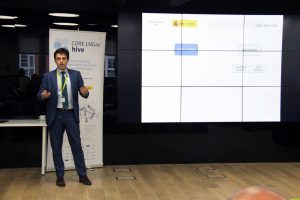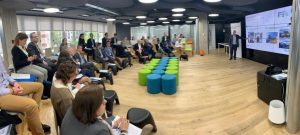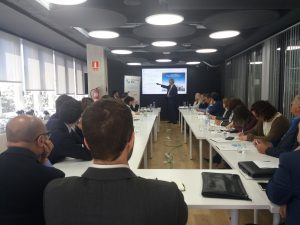Liquefied natural gas, the sustainable future alternative for mobility
/0 Comments/in New, Noticia /by CommunicationSecond CORE LNGas hive project Stakeholders group meeting held May 10th
/0 Comments/in New /by CommunicationThe second meeting of the project stakeholders’ group took place in Madrid on May 10th, counting with the participation of some of the representatives of the 79 companies that formally decided to join this group. Among them there are shipbuilders, engineering firms, shipping companies, public administrations, universities, port authorities and category associations that permit enabling a fruitful bi-directional information flux capable of overall enhancing the project outcomes and the sector knowledge.
Organized by the project coordinator Enagás, the meeting pursued the aim of presenting to the attendees the results of the Study on LNG Supply Demand and Logistics Chains and the tool developed for that purpose. Furthermore, CORE LNGas hive project updates and LNGHIVE2 strategy were also presented. The activity has been conducted in the framework of the stakeholders’ engagement plan, defined in order to take on board external feedback as essential element required in order to maximize the project impact.
Enagás Entrepreneurship General Manager, Fernando Impuesto, opened the meeting by stressing the protagonist role that the 42 partners and the stakeholders have within the project. He thanked the stakeholders for their participation and reminded the new opportunities that LNG offers, notably within maritime transport, as well as the forecasted evolution of the demand for liquefied natural gas. Puertos del Estado, represented by Antonio Góngora, Head of logistics and intermodal area, shared with the attendees the progress of the revision of the “National Policy Framework for Alternative Energy in Transport”, and the LNGHIVE2 strategy, the follow up of CORE LNGas hive. José Enrique Murcia, Project Technical Leader, presented the updates of CORE LNGas hive, explaining the efforts of the 42 project partners in the development of feasibility studies and pilots covering different typologies of infrastructures (including barges, jetties, tugs, straddle carriers, mobile OPS and LNG/CNG stations).
The final part of the meeting was key for the explanation of LNG demand and supply logistics chain results, presentation done through an interactive session with case studies. The event was also great networking opportunity for all the attendees.
See some pictures of the event:





